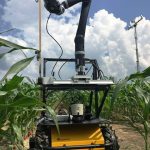 Farming may not seem like an industry that is beset with change and innovation, but it is actually one of the more creative sectors in terms of its use of technology. Whilst it’s fair to say that while there remains a lot of variance in the technologies available today, there remain some interest technologies around the corner.
Farming may not seem like an industry that is beset with change and innovation, but it is actually one of the more creative sectors in terms of its use of technology. Whilst it’s fair to say that while there remains a lot of variance in the technologies available today, there remain some interest technologies around the corner.
Some of these were discussed in a recent paper for the UK government on the future of farming. The paper explores some of the key drivers in global agriculture today, and the challenges the sector faces both in terms of maintaining food production and sustaining the environment.
Drivers of change
Global population is not only growing considerably, but as countries like China and India become wealthier, their food consumption rises significantly. The paper suggests that agricultural production will need to double in the next 30 years to meet this demand. This is no easy feat, as the yields of maize, wheat, rice and soybeans are growing at much less than the 2.4% per year required to meet this demand.
As agricultural production intensifies to meet this demand however, this is likely to place a growing strain on the environment, both in terms of increasing greenhouse gas emissions or the use of fertilisers. It’s an industry that is already responsible for around 24% of greenhouse gases, which is roughly the same as electricity and heat production combined. It’s also the biggest polluter of waterways in many countries around the world, whilst water usage for irrigation usually far exceeds the replenishment rate. Throw in the impact on biodiversity and soil degradation and the environmental impacts are considerable.
The paper highlights the level of innovation in the sector, with 29% of farms around the world investing in projects to increase their food production without increasing the amount of land they use. These innovations involve things such as data-enabled precision agriculture and robotic farming. The paper reminds us however that whilst these approaches can improve yields, they won’t be enough to reduce environmental impacts without significant changes in consumer behavior, specifically in terms of food waste and dietary preferences.
“Moving to a more climate-resilient agricultural system would be needed to avoid increased price volatility and economic uncertainty affecting food security,” the authors say. “A recent study suggests increasing technologies, changing dietary habits and reducing waste will all be necessary interventions to achieve planetary sustainability.”
A coordinated approach
Nonetheless, the authors believe that innovations can provide benefits throughout the supply chain, providing they are undertaken in the correct manner. They advocate a strategic approach to the coordination of new ag-tech with consumer attitudes.
“Studies have shown the importance of co-creation of agricultural knowledge to allow for adaptation of innovative practices and technology,” they conclude. “In 2011, the House of Lords EU Committee highlighted that this requires: better cooperation between farm businesses, advisory bodies and scientists; improved interdisciplinary research; and farmers becoming actively involved in setting agricultural research agendas.”
It’s easy at times to get hung up on the new technologies entering particular industries, but this paper is a nice reminder that for these technologies to be effective, they need to be considered alongside a wide range of other factors.